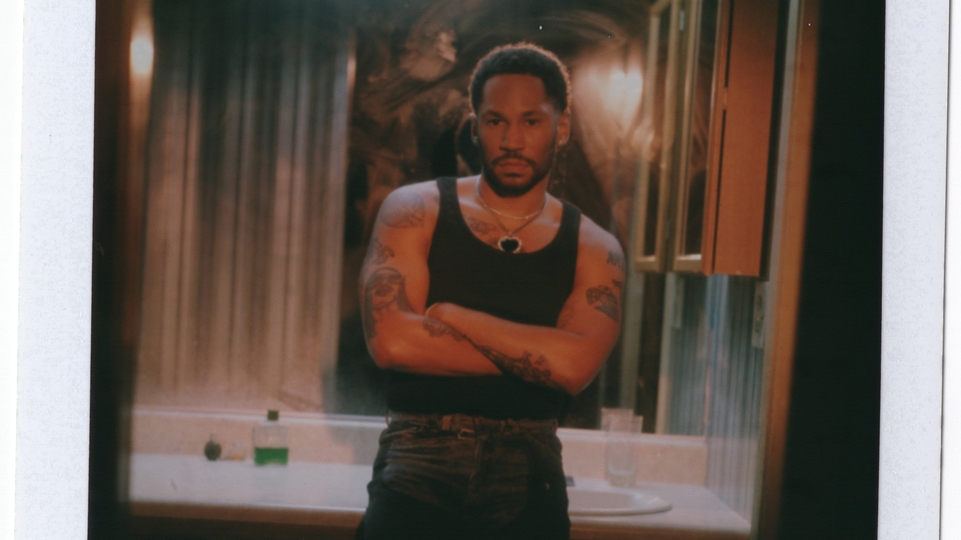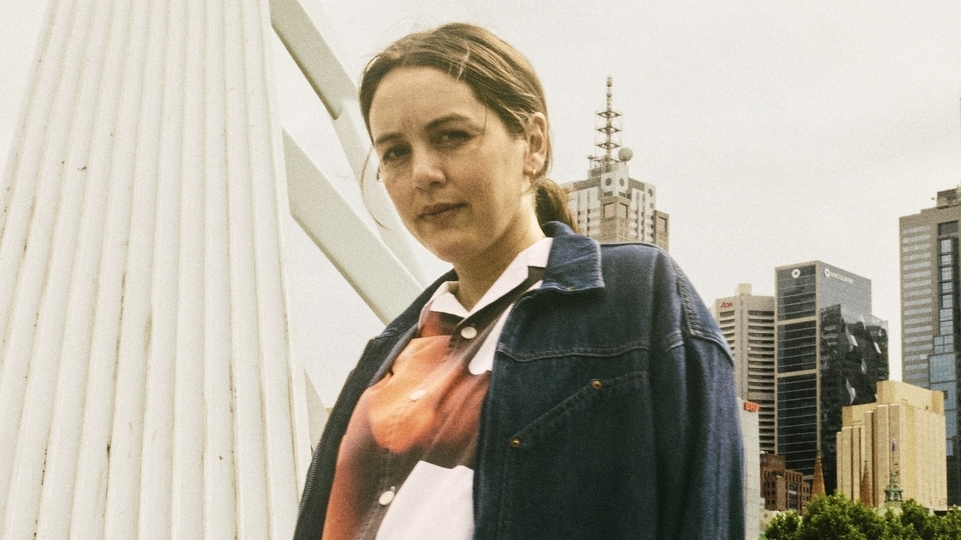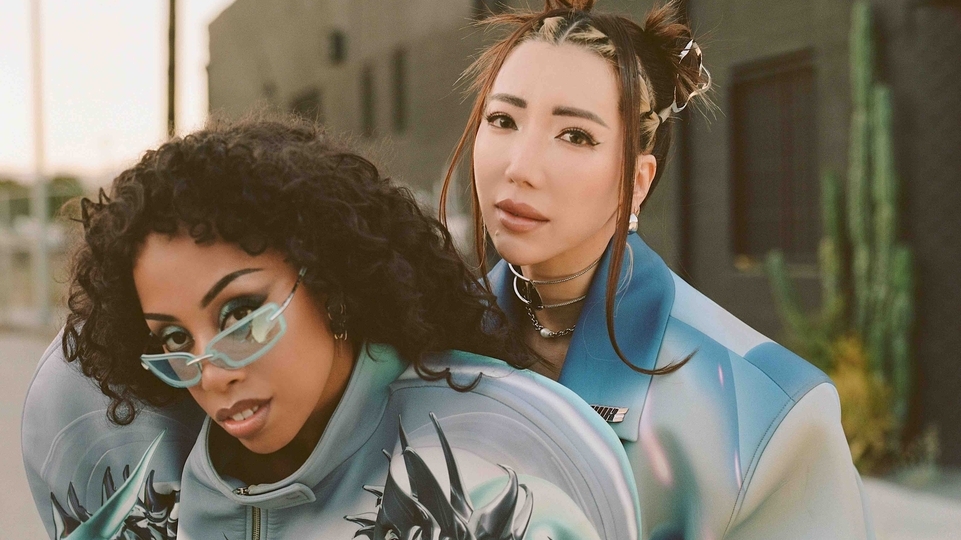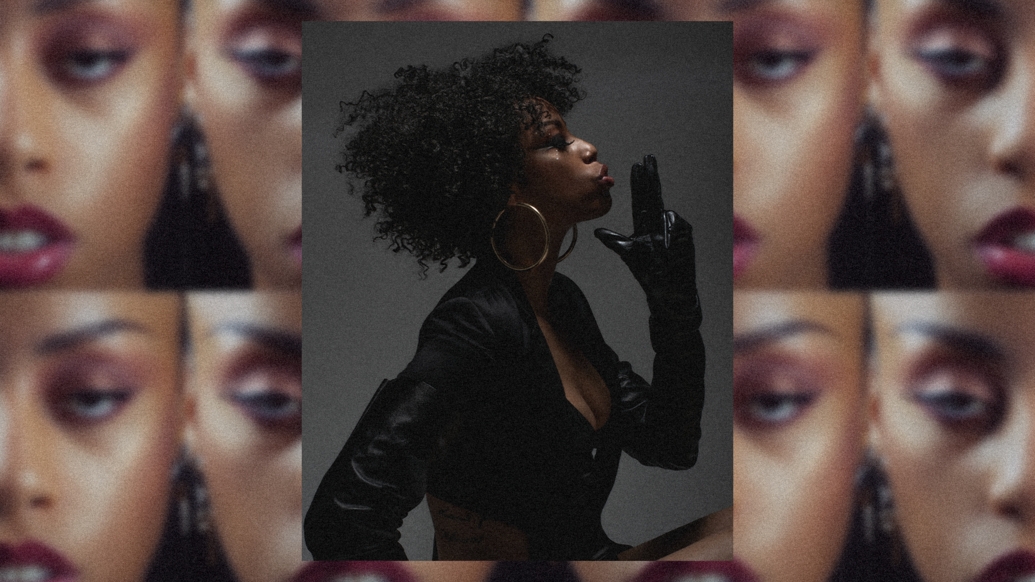
Rochelle Jordan: agent of change
After the 2014 release of ‘1021,’ London-born, Toronto-raised, and LA-based artist Rochelle Jordan went through years of business and health-related difficulties, finally coming out the other end with last year’s emotion-drenched ‘Play With The Changes.’ A new remix album, featuring brilliant work from DJ Minx, Byron The Aquarius, Machinedrum and other notable acts, lifts Jordan’s theme of rejuvenation into a thrilling new phase
Rochelle Jordan is sitting in her car, the AC whirring in the background. It’s the tail-end of LA’s latest heatwave, and though you wouldn’t know it by looking at her, she’s feeling it. “I’m in the valley,” she says, “in the heat bowl. Yeah, it’s burning hot. It’s hell!”
Still, despite the searing temperatures, Jordan’s in a relaxed mood, fully chill — just as she should be. In just over a week, ‘Play With The Changes Remixed’, a re-fabricated rendition of last year’s ‘Play With The Changes’, would be coming out on TOKiMONSTA’s Young Art Records. But for now, Jordan and her team are among the few who know just how good the collection of remixes is.
The original version of ‘Play With The Changes’, a long-delayed follow-up to her previous releases — 2011’s ‘Rojo’, the following year’s ‘Pressure’, and 2014’s ‘1021’ — is a sparkling set of emotionally resonant, stylistically kaleidoscopic R&B, with Jordan’s introspective lyrics and gliding vocals giving even its tougher moments an ethereal aura. Like her previous output, spectral traces of the sounds of her youth, specifically the strains of ’90s dance music, thread their way throughout the LP.
Jordan’s lived in California since 2014, and most of her prior life was spent in Toronto — but she’s originally from London, where she lived until moving to Canada at age four. One brother moved with her, bringing a cache of cassette tapes with him; her eldest brother stayed behind and sent yet more tapes. The music embedded in those tapes is seared into her psyche.
“Those tapes, they had no titles on them,” Jordan says, ‘I can’t even tell you the names, which is so annoying even now. Sometimes I’d call him — ‘Are you serious? Just give me a name, please!’ He’d be like, ‘I don't know. try to find it on YouTube!’” Jordan eventually did discover a few of those names, like Sounds Of Blackness, the soul and gospel ensemble who scored a handful of house hits in the early ’90s via tracks like ‘The Pressure Pt. 1’ and ‘Joy’; the pioneering 2-steppers Artful Dodger and the proto-junglists of Shut Up And Dance were two others. “But for the most part, it was just amazing music from nameless artists coming through the wall,” she says, “just lots of drum & bass and garage.”
‘Play With The Changes Remixed’ further cements Jordan’s dancefloor bona-fides, spiralling the original album’s intimate feel into various reaches of clubland’s ecosystem. But according to Jordan, a full album of reimagined versions wasn’t the plan at all. “We got a remix from Kaytranada,” she says. “We had been in contact, going back and forth and just creating together. I asked him, just threw the idea for a remix out there, and he said, ‘Of course I'll do it!’” His interpretation of ‘All Along’ takes the New Jack Swing of the original and transforms it into a leftfield roller-jam boogie number, its woozy organ sauntering along over rubbery bass while Jordan sings a paean to her best friend/true love.
“I was like, ‘What?’ And at that point, after getting that first one and hearing how fire it was, it started spiraling,” Jordan recalls. “I realised that, you know what? To create a remix project of songs that are essentially changed, that really matches the theme of ‘Play With The Changes’. And it sounds like a whole new album.”
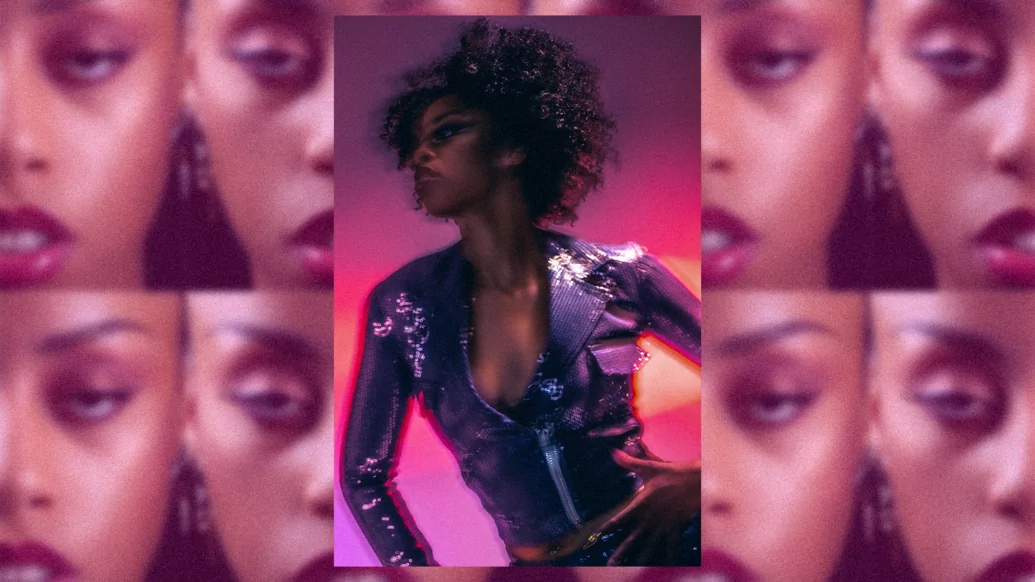
“Challenges boost my creativity. I like hearing a beat that sounds kind of intimidating, or the chords are changing a lot, or the drum pattern is constantly shifting, and I have to find my pocket within all those things”
She’s right, up to a point — with Jordan’s voice front and center, the 12 reworked tracks are still brimming with the Jordan vibe. As to what that is, exactly, that’s hard to pin down: One review of ‘Play With The Changes’ tagged her as a “postmillennial Donna Summer”; another went in the opposite direction, saying that the LP was “distinguished by its introspection and near-claustrophobic melancholy”. “Oh, I don’t think I’d call myself melancholy,” she says, with a laugh that proves the point. “Yeah, that’s not me. I’m a mix of a bunch of different things. I’m naturally an introvert — but I present extrovert, if that makes any sense. I have a weird little battle within myself.”
Whatever the case, the remix album is a prime collection of cuts, from a varied bunch of producers who all manage to put their individual stamps on the songs while leaving the Jordan aura intact. DJ Minx takes ‘Dancing Elephants’ in a subdued Detroit-meets-Chicago circa 1990 direction, while Byron The Aquarius’s house mix of ‘Something’, all twinkling chords and cooing choruses, is a gem. Denver-via-Detroit’s Sinistarr gives ‘Next 2 You’ a heavy dose of ravey stomp, Kelvin “KLSH” Montgomery’s drum & bass version of ‘Count It’ manages to be both immensely propulsive and supremely laidback, and Machinedrum’s take on ‘Lay’, with its skittering hi-hats and celestial builds, provides one of the release's best moments.
“Everything that came in, I was like, ‘Yes!’ I didn’t know how this was happening, but I loved every single one of those remixes,” Jordan says. “It was amazing each and every time.” KLSH and Machinedrum, along with Jimmy Edgar, make up Jordan’s core group of producers; KLSH, in particular, has been working with her since the ‘ROJO’ days. “I think what I find most intriguing about those three producers is their stance in creation,” Jordan says. “They are all extremely different, but they speak a language in music that is just very enticing and unique, and that’s what I look for. Challenges boost my creativity. I like hearing a beat that sounds kind of intimidating, or the chords are changing a lot, or the drum pattern is constantly shifting, and I have to find my pocket within all those things. That’s what those guys do, very specifically, and they do it so well.”
“The Neptunes with Kelis,” she adds, “or Tim [Timbaland] with Missy Elliott and Aaliyah, or Rich Harrison and Amerie, or 40 and Drake or Doc McKinney and The Weeknd — there is a formula and a combination that creates one specific feeling that they generate over and over again, and it’s strong and it’s striking. That’s something that I’ve always paid attention to when listening to music, and I’m just blessed that I found my team for that.” Releasing a remix follow-up to ‘Play With The Changes’ had an added benefit. “It gives the album more life, which is something I wanted for the album, as it took years to complete,” she says. “There was a lot of drama around making the album, so for there to be another piece of ‘Play With The Changes’ that will help it live on, is really special to me.”
Jordan is speaking to DJ Mag just hours after Buckingham Palace made the announcement that Queen Elizabeth II had passed away. Jordan hasn’t lived in the UK for decades, and she’s hardly a royalist (“Well, I’m a half royalist — I’m a Princess Diana fan”), but she gives props to Elizabeth for longevity. “I mean, she was old when I was a baby! I don’t know what she was eating, or what exercises she was doing, but we all need to take heed of whatever her lifestyle was,” Jordan says. “I guess it’s just because she was a royal, so maybe it was just having a stress-free life.”
It’s probably true that, when the worst thing you have to worry about interrupting your corgi walking routine is the occasional sit-down with a prime minister or photo op with a visiting head of state, your odds of making it to 96 are pretty good. But for Jordan, things haven’t always gone so smoothly — which would help to explain why there’s a seven-year gap between ‘1021’ and ‘Play With The Changes’. In 2014, things were seemingly going smoothly for Jordan. Beside the release of ‘1021’, she’d also found herself opening for the UK’s Jessie Ware on a North American tour and collaborating with Donald Glover on the Childish Gambino tune ‘Telegraph Ave’. She also locked herself into a label and management deal — which, as it turns out, was a big mistake. Though Jordan doesn’t go into details, it didn’t go well.
“Dealing with the business side of music is pretty challenging for an artist,” Jordan says. “A lot of the time, we’re already dealing with internal battles to make a good product, or even just to convince people that you’re even worth it, that you have value and that you should be in this sector of life creating music for people to hear, and you want it to go out to the masses. And you just hope that it’s a smooth ride to that goal, but it’s not.”
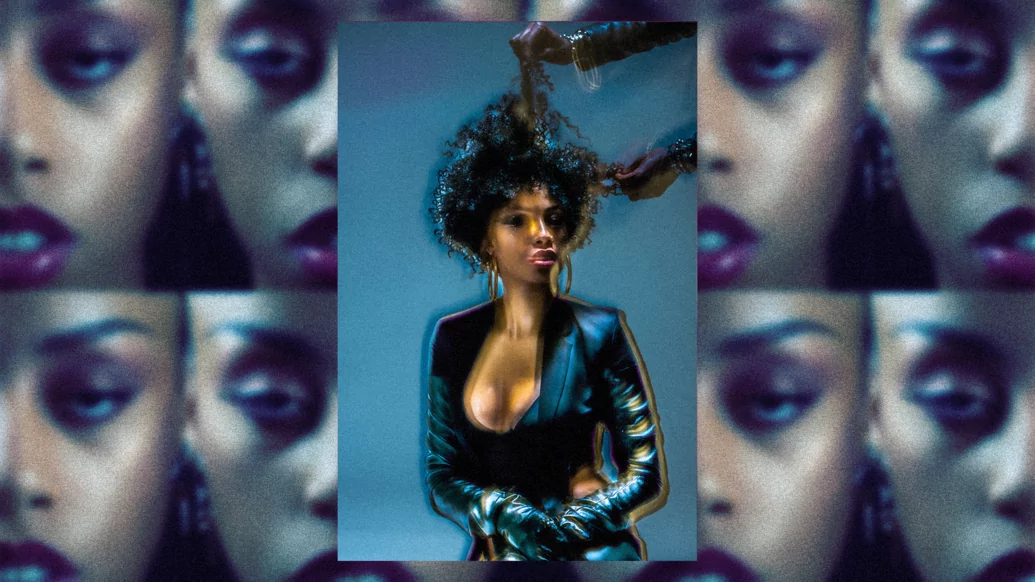
“I’m naturally an introvert — but I present extrovert, if that makes any sense. I have a weird little battle within myself”
The effect on Jordan’s creativity was, for a time, devastating. “With all that pressure, you internalise it, and that makes it more difficult for you to flow, to tap into a higher power to fluidly create,” she explains. “A lot of fear started to rise up within me, and would create blocks. And then when the blocks happen to you as an artist, now you start questioning yourself and your art — if you even can create — and it becomes a domino effect.” There were health issues as well. Jordan suffers from Hemoglobin SC disease, a type of sickle cell disease, that causes pain and fatigue, among other symptoms. “Yeah, that was a whole other battle,” she says with a sigh. “I'd have my down moments, but I would always come out the other end punching, which is something that I give myself credit for.”
Either bad business dealings or major health problems would likely be enough to lead some artists to call it quits; taken together, only the strongest would have carried on. Not only has Jordan made it through the other end, she feels that it may have helped her to delve deeper. “I like to think that I also plugged a lot of what I was going through — maybe not so obviously — into these songs,” she says, “in terms of the passion and the rage, as well as the excitement of the good things that were happening during that time as well. And these are all the things that I feel it takes to make something that will be worth it in the end, something that will be inspirational.”
It’s not like she had thought much about alternate career options, anyway. “I’ve never considered a plan B,” Jordan claims, “even when this thing was almost dead to me — which is really crazy to think about.” She pauses a few seconds to ponder the possibilities. “Okay, if I had to do something else, I would say probably working with animals, like a nonprofit, maybe something to help with veterinarians, because I know that they struggle a lot and it’s a very, very stressful job. I love animals more than I love myself. I’m an animal person. So I think maybe something in that realm.”
Jordan performed at this year’s edition of Coachella and Denver’s Vortex Festival, among numerous other dates; since the release of ‘Play With The Changes Remixed’, she’s been crisscrossing the continent in support of the album. Though she claims to be part introvert, you wouldn’t know it by her demeanour in a live setting. “I don’t know why, but I’m very natural on stage,” she says. “The extrovert really comes out, and lots of the time, I don’t even know who that person is. I’ll look back and I’m like, ‘Okay, that's bizarre.’ It’s very interesting. Maybe the brain is compartmentalising things? Or maybe it’s because I’m doing music, which is my love, so I’m able to pull out this other person that’s within me. Whatever it is, I’m very happy to be on stage. There’s a rush going onstage, and there’s a rush coming off the stage.”
Talk of tapping into other selves leads Rochelle to realise that she may have misspoke when she said she had never really considered career alternatives. In 2014, the year of ‘1021’, opening for Jessie Ware, and working with Donald Glover, she lent her vocal talents to the animated Adult Swim show Black Dynamite, voicing the role of Cindy Breakspeare in an episode titled How Honeybee Got Her Groove Back or Sexodus or Night Of The Living Dickheads. A few of the episode’s costars: Chance the Rapper (playing Bob Marley), Erykah Badu (as Rita Marley), Mel B, and the show’s creator, Carl Jones.
“I got asked by Carl, because he was a fan of the music,” Jordan explains. “I was like, ‘Okay,’ but I hadn’t given it any thought prior to that. I got in the studio, and he's like, can you say that line in a Jamaican accent? And I did it — but I was so intrigued by the process that I realised that, no, dum dum, you’re supposed to really get into a character vibe! So I judged that first experience so harshly.” She shouldn’t — if you watch the episode, you’ll see she acquits herself with flying colours.
“Anyway, I think I might have lied when I said I don’t have a plan B,” she continues. “I mean, I don’t really think of voiceover as an actual plan B, but more like it’s a part of this world that I’m creating for myself. It’s a huge interest of mine — any kind of voiceover situation, but mainly cartoons. As time progresses, I think I might pivot to that, actually, maybe into acting in film and TV, specifically with my voice.” But voiceover work will have to wait. For now, there’s music to be made, songs to be sung, and life to be lived.

